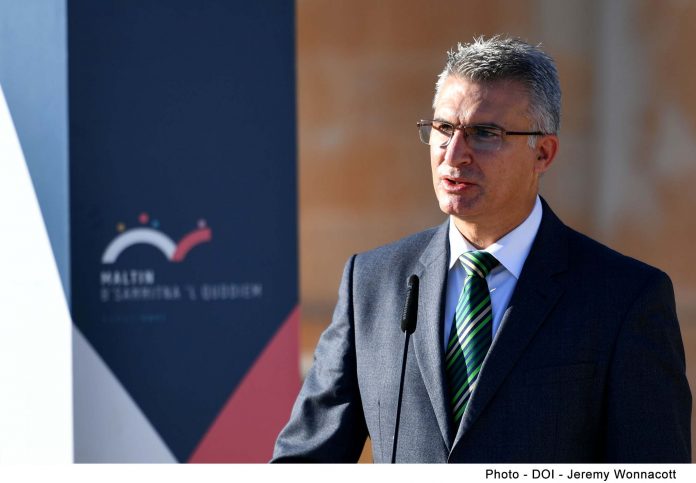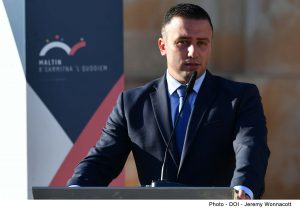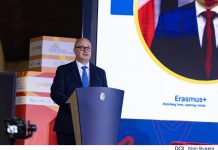
Minister within the Office of the Prime Minister Carmelo Abela and Parliamentary Secretary for Financial Services and Digital Economy Clayton Bartolo explain how the 2021 Budget safeguards employment and workers at present while also helping to prepare for a world post- COVID and for the next 10 years. The minister and the parliamentary secretary addressed a press conference in Villa Bighi with the theme: ‘Maltin b’Saħħitna Flimkien – Baġit 2020’.
In his speech, Minister Carmelo Abela explained how the philosophy of the government is to listen to social partners, workers, employers and everyone involved. “We have shown how this really is a budget for the workers and employment, in a country with a government that cares. Where the government does not rely on what the worker has achieved over these seven years but one that is always more encouraged to do more for our workers and to create jobs.”
Minister Abela, who is responsible for working conditions amongst other things, gave an account of the social measures in the 2021 budget which address workers. These include:
- Tax rebate for everyone who works;
- Another €100 in vouchers per person over the age of 16 years;
- Improvement in in-work benefit for more workers to benefit;
- Improvement in children’s allowance;
- Another €9 million for compensation of past injustices;
- Commitment to help former shipyard workers affected by asbestosis and the wage supplement which will continue until March with an investment of €200 million;
- Another day of leave which others had taken from workers and families.
Minister Abela mentioned that another reality that needs to be addressed is the situation of remote working. He said that these changes in the working environment are being addressed by means of modernising the regulatory framework. This should allow employers to make decisions in the shortest and most flexible manner while granting rights to all those workers, whatever their employment contract and wherever their workplace. To this end, Minister Abela said that months ago he had started a discussion with unions and employers in the MCESD and work is currently being done on a proposal.
Minister Abela also said that another aspect which government is working on with an aim of strengthening work and employment is the creation of an investment climate for business. That is why in the 2021 Budget, the government:
- Extended the incentives launched at the start of the pandemic. So far about 16,900 businesses have benefited from a Covid Wage Supplement. With the rest of the schemes we have assisted around 20,000 businesses;
- The threshold for VAT exemption will be increased from €20,000 to €30,000;
- A new scheme will be launched by the Malta Enterprise to support innovative investments (industry 4.0 / use of AI);
- Start-ups – a framework is being drawn which will make Malta attractive for start-ups wishing to operate in Europe.
Minister Abela concluded by referring to the 2021 Budget as a budget for tomorrow. While supporting the worker and employment, it plans ahead for the next 10 years and offers opportunities for the future. At the same time, it is also a budget that focuses on the sustainable economy, the green economy, the Green bonds, on Malta becoming carbon neutral by 2050, and a future that also embraces digital economy.
In his keynote speech, Parliamentary Secretary Clayton Bartolo spoke on how digital economy is the world of tomorrow and highlighted how the budget announced a few weeks ago continued to increase the importance of this sector.

“No one can deny that the traditional sectors on which the Maltese economy is based have borne fruit in terms of the economic growth that our country has experienced in the last seven years. However, I firmly believe that the future begins today”, the parliamentary secretary.
He added that this budget is a consolidation for the digital sectors as our country is looking at the restructuring of Malta’s Digital Strategy, by attracting to our shores emerging technologies such as Virtual Reality, Augmented Reality, Immersive Technology, 3rd Printing, Quantum, High Performance Computing, Blockchain, Artificial Intelligence, Big Data among others.
Parliamentary Secretary Clayton Bartolo also pointed out that this budget will be opening doors for integrating the digital economy into tourism, Gozo, art, the Maltese language as well as the judicial system.
“As we can see, this was a budget that is helping the present for a better tomorrow. In the forthcoming years, the digital economy will become more integrated into our society. These are important changes that we need to preach to our people. This is the only way for our country, which lacks natural resources, to remain competitive and at the forefront of the economic growth we have achieved in the last seven years. I am confident that after these challenging times, our work will continue to intensify so that we can reach our goal of creating a digital Malta”, concluded Parliamentary Secretary Clayton Bartolo.









